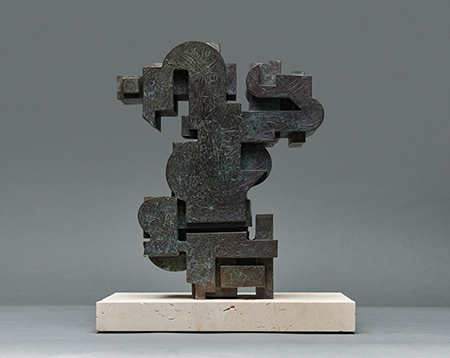
Continuing through March 25, 2023
The title of Jud Bergeron’s current show, “Subspace Biographies,” quotes the chorus of a Robert Pollard song satirizing the unfulfilled life (“I do my job each day”) of “an undetermined person,” i.e., someone who has allowed social norms to determine their choices. Artists resist such strictures, supplanting the dictates of authority with the challenges of the self-determined creative life. Can participation in a massive multiplayer online space shooter game like “Subspace” constitute a real life?
Bergeron’s 2016 show, “From Analog to Digital and Back Again” (at K. Imperial Gallery) with its humorous evocation of hobbit quests, featured geometric sculptures made using a combination of traditional and digital media and methods, beginning with cut-paper polygons intuitively taped together into faceted crystal or mountain forms suggestive of folded-paper origami. He then scanned those templates into 3D computer programs to prepare printed models for later casting into bronze or white fiberglass resin. One of these works sits atop the gallerist’s desk.
The current sculpture derives from the artist’s experiments with screen printing, the onetime medium of political posters and commercial placards, installed here at the gallery entrance as an introduction to the bronzes that developed from that earlier impulse. Three square-format abstractions, all untitled, juxtapose black composite geometric forms — suggestive of the squares, rectangles, and rhombuses and semicircles of Tangram puzzles — superimposed on layers of textured silver and gold leaf. These eccentric forms are pure Constructivism, albeit multiplied and combined. They evoke architectural floor plans, industrial fabrication diagrams, ambiguous symbols (à la Matt Mullican); and even a kind of fractured, mutated Cubist typography in which words’ components are isolated and set free, Dada-style, from representation.
These mysterious two-layer ideographs and pictographs return impressively in a series of cast bronze and resin wall reliefs called “Cyclopean Runways. ”The title thematically fuses the archaic and monumental (cyclopean, massive stone blocks or megaliths from ancient Mycenae, supposedly fabricated by mythological giants) with the modern (airport and fashion runways).
Bergeron’s new pictographic vocabulary culminates in cast bronze sculptures composed of five-inch cube modules that sit heavily and immovably on steel and marble plinths and on trestle tables. These mysterious objects blend past and future, as though archaeological specimens of Shang Dynasty tripod cauldrons meeting Mesoamerican statuary; modernist architecture (Le Corbusier’s Villa Savoie); undecipherable cast-lead type; and vaguely menacing machinery. The artist’s titles here may be ironic and humorous (“Hey Aardvark,” “Flotilla,” “Dreaming the Temple (Large),” “Unshaven Bird, A Trophy Mule in Particular”), but the works themselves enact Ozymandian hubris and decline. Echoing the somber monumental assemblages of Louise Nevelson, the eroded, excavated figures of Stephen DeStaebler, and Robert Indiana’s iconic “LOVE” sculptures fallen into decay, Bergeron’s powerful but ambiguous sculptures crystallize the human condition in fraught times into mesmerizing, fascinating metaphors.
